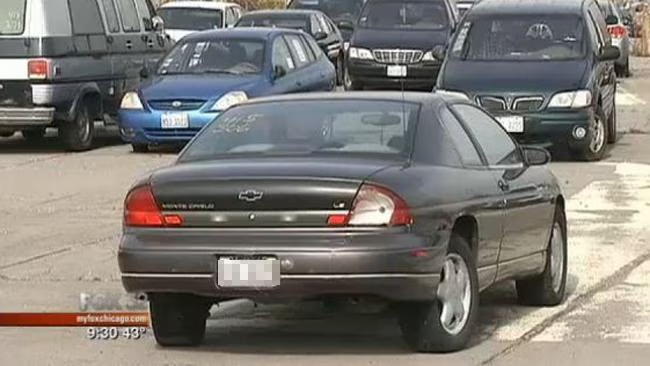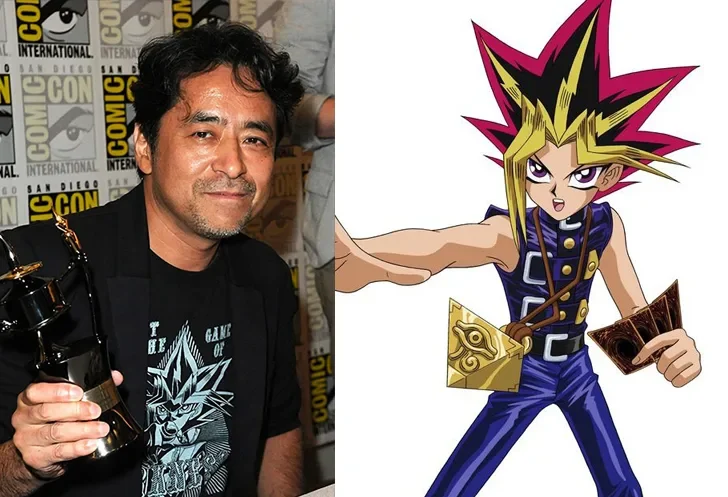In early 2008, Jennifer Fitzgerald didn’t think twice when her boyfriend, Brandon Preveau, bought a car and registered it with the DMV.
Brandon was a ground-operations employee for United Airlines at O’Hare International Airport in Chicago, and she knew he needed the car for getting to work. No problem.


At the time, their relationship seemed fairly solid. They had been dating for several years and had a young daughter together, so Jennifer could never have imagined that this minor piece of paperwork would one day lead her to the largest parking fine in Chicago’s history – over $100,000.
The Breakup and the Abandoned Car
The car, a purple 1999 Chevy Monte Carlo, had been purchased for $600 from Jennifer’s uncle, Patrick Fitzgerald, using Brandon’s 2007 tax refund. Although he was the main driver, he had titled it in Jennifer’s name for convenience.
By late 2009, their relationship had fallen apart, and Brandon and Jennifer had gone their separate ways; whether this was an amicable breakup or otherwise remains unknown to the public.
In December 2009, Jennifer began receiving official notices from the City of Chicago. They listed escalating parking fines – violations for overstaying the 30-day limit, for being in a “hazardous” or “dilapidated” condition, and, later, for being abandoned.
She immediately knew that the parking fines concerned the purple Chevy Monte Carlo that, as far as she was aware, belonged to her ex-partner. Surprised that the car was registered in her name, she reached out to Brandon.
Jennifer Couldn’t Move the Car
But Brandon wasn’t interested in helping. In fact, sometime that November, Brandon had parked the Monte Carlo in the United Airlines employee lot at O’Hare – and had quite simply walked away.
Jennifer tried to move the car herself, but Brandon had parked it in United Airlines’ private parking lot, a secure, employee-only section of the airport inaccessible to the public. Jennifer had no way to get to it herself, and besides, she didn’t have any keys.

She had a problem. The car was registered under her name – and under Chicago law, that meant responsibility was hers, too, despite the fact that she didn’t drive the car or have access to it.
But there was one silver lining. The City of Chicago’s Department of Aviation maintained signs stating that any car left in an O’Hare lot for more than 30 days without notice could be towed and impounded.
That should limit how much the accumulated parking tickets would cost in total, at least, in theory.
A City That Kept Ticketing
Because, when thirty days had come and gone, the letters and fines continued to pour into Jennifer’s mailbox, each time with new charges added.
December came and went, but the penalties kept on coming. The weeks turned into months, and the months turned into years.
Jennifer called and wrote to the city departments, explaining that she neither owned nor controlled the vehicle. Still, every search of city records led back to her. She could neither escape responsibility nor solve the problem. It was a living nightmare.
According to later court filings, Brandon remained a badged United Airlines employee.
He occasionally moved the car around the lot, apparently even possibly removing tickets placed on its windshield. This meant that although hundreds of tickets were issued, few would have been visible to the enforcement officer at any given time.
Then, things started to get ridiculous. Brandon stopped moving the car around the lot, and it became obviously derelict. Its windows were broken, its headlights smashed, its registration expired, and its paint peeling. Jennifer got tickets for all that, too.
In all this time, there was not one record of the city of Chicago ever towing or impounding the Monte Carlo. Jennifer later contended that both United Airlines and the city failed in their duty to remove the vehicle. If they had, the parking fines would have been considerably less.
“Move the Car. Please.”
Over the next three years, Jennifer and her family repeatedly pleaded with Brandon to move the car. Her lawsuit later stated that these requests occurred on “occasions too numerous to list.”
But Brandon never did. And he never gave a reason. All Jennifer could do was watch as the debt snowballed.

Then, one morning – October 13, 2011, to be precise – the collection attorneys for the city told her that her name was now listed in the Chicago Department of Revenue’s ‘Top 100 Scofflaws.’ It was an online hall of shame for those owing the city the most in unpaid tickets.
The city warned that she could lose her driver’s license, and it may even have been suspended. The high debt would also have impacted her credit on some level. Jennifer had become, in bureaucratic terms, a high-risk debtor for a car she’d never driven.
Finally, in October 2012, in a move long overdue, the Monte Carlo was removed from the United Airlines parking lot. It would no longer accumulate any more tickets. But by now, Jennifer’s total charges were astronomical: $105,761, across 678 citations.
She was a working single mother. Over $100,000 in parking fines was never something she could afford. And so, Jennifer took it to court.
Taking It to Court
In November 2012, Jennifer filed a civil suit in Cook County Circuit Court against three parties: Brandon Preveau, United Airlines, and the City of Chicago.
Her attorney, Harold W. Wallin, argued that Jennifer “was never the owner of the automobile, had no control over the automobile when the parking tickets were issued, and is not responsible for the parking tickets.”
The complaint sought to void the fines and recover damages for negligence and emotional distress.
United Airlines responded that the car had been in a lot reserved for employees, where Brandon – then still an employee – had authority to park.
The city, for its part, admitted that tickets were occasionally removed and that the vehicle was moved multiple times within the lot by an authorized employee. But both entities distanced themselves from responsibility for the growing debt.
The Monte Carlo was effectively invisible to the system. It was a car left on semi-private property that fell between the city’s and United’s jurisdictions.
It was easy for both sides to blame the other, so neither took responsibility. That meant that Jennifer’s name bore all the legal liability, and nobody in authority had any interest in stepping in to stop the fines from piling up.
Negotiations and Settlement
Now, in late 2012, Jennifer’s case began attracting public attention. The absurdity of a parking fine surpassing $100,000 made national news.
Facing scrutiny, the City of Chicago quietly opened settlement talks with Jennifer. In August 2013, after nine months of legal back-and-forth, both sides reached an agreement.
The city dropped just over $100,000 in fines, leaving a final balance of $4,470 – allegedly the total owing after just 30 days, when someone should have towed her car away.
Brandon Preveau agreed to pay an initial down payment of $1,600. Jennifer would cover the remaining $2,870 through monthly installments of $78.
While it certainly wasn’t ideal, and Jennifer didn’t get the payouts she was looking for, it would finally bring her four-year nightmare to an end.
Aftermath
Jennifer must have been glad to have had the whole thing put behind her. She kept working, raising her daughter, and rebuilding her credit.
As for Brandon Preveau, her ex-boyfriend, he has never publicly commented on what happened or why.
The Monte Carlo itself, the car that had caused so much trouble, was eventually removed and scrapped. Jennifer Fitzgerald must have been glad to see it go.
She remains a private citizen, having moved on from the media glare. But her case remains one of Chicago’s most notorious examples of a runaway accumulation of parking fines.
Sources
https://www.bbc.co.uk/news/world-us-canada-23817394
http://abcnews.go.com/blogs/headlines/2013/08/woman-settles-with-chicago-over-100000-parking-fine
https://www.the-sun.com/motors/12857917/abandoned-car-chicago-ohare-ex-boyfriend













Leave a comment